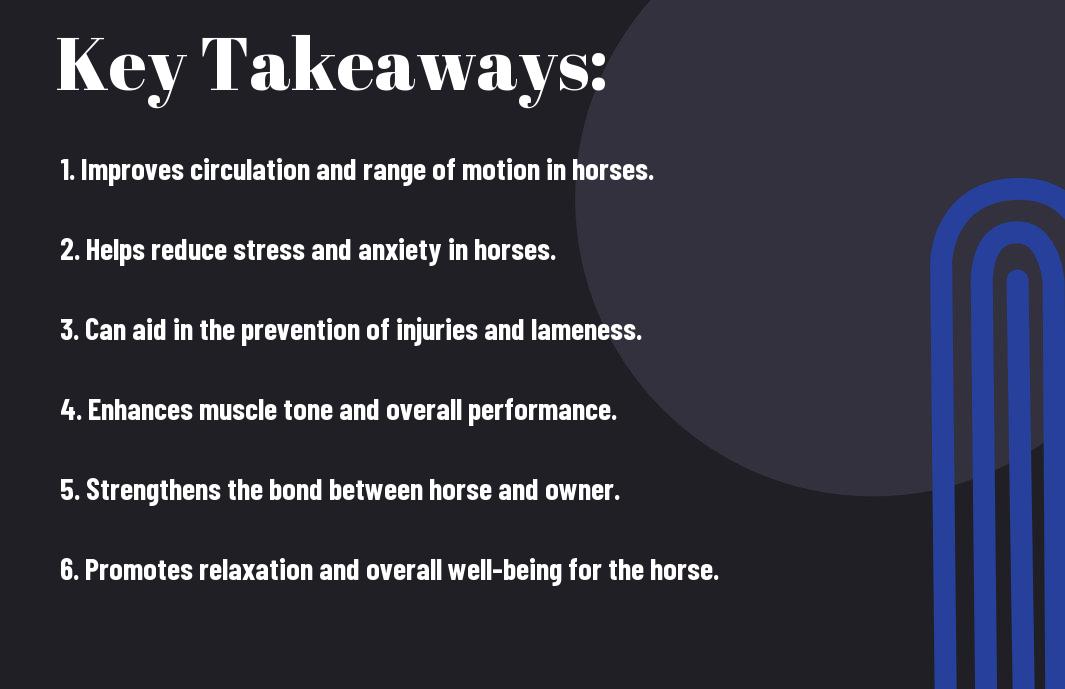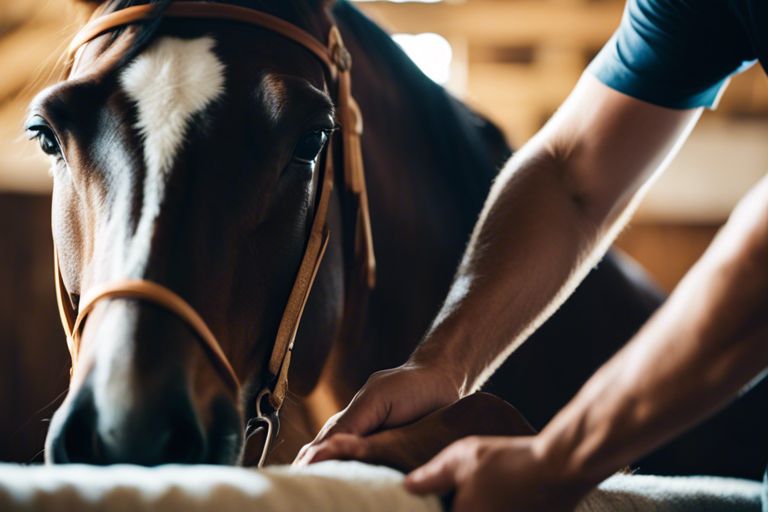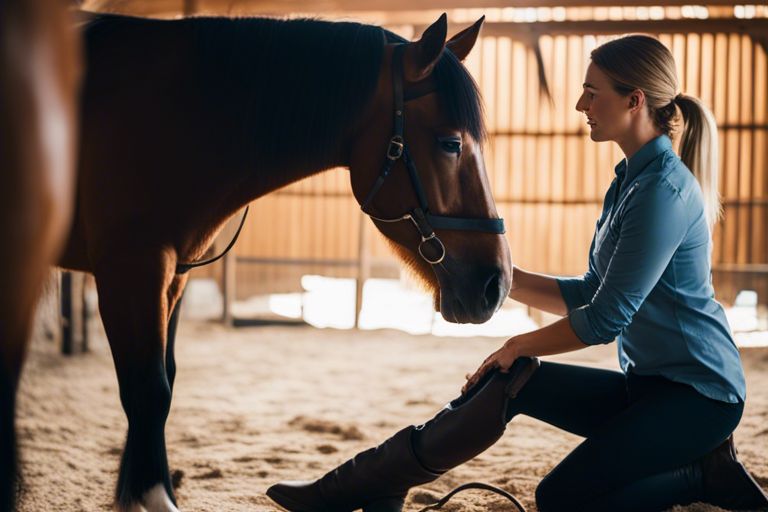Benefits of Horse Massage Therapy are numerous for your equine companion. Not only does it promote relaxation and reduce stress, but it also improves circulation, enhances flexibility, and can help alleviate muscle tension and soreness. By investing in regular massage sessions for your horse, you can enhance their overall well-being and health. Whether your horse is an athlete or a beloved pet, incorporating massage therapy into their routine can bring significant benefits.


The Science Behind Horse Massage Therapy
To fully understand the benefits of horse massage therapy, it is vital to research into the science behind it. Massage therapy for horses works on a physiological level, affecting various systems within the horse’s body.
How Massage Affects the Horse’s Body
Affects such as improved circulation, increased lymphatic drainage, and release of endorphins are some of the key ways massage therapy impacts your horse’s body. Improved circulation helps deliver nutrients and oxygen to muscles and tissues, aiding in the healing process and reducing inflammation. Furthermore, the stimulation of the lymphatic system helps remove toxins and waste products from the body, promoting overall health and well-being. The release of endorphins during massage induces a state of relaxation and can help alleviate pain and stress, contributing to your horse’s overall comfort and performance.
The Role of Touch in Horse Behavior
Any horse owner knows the significance of touch in building trust and forming connections with these majestic animals. Touch plays a crucial role in horse behavior, shaping their responses to stimuli and interactions with humans. Incorporating massage therapy into your horse’s routine can strengthen the bond between you and your equine partner, enhancing communication and understanding.
Behind the instinctual reactions lies a deeper connection that is fostered through physical touch. By engaging in massage therapy sessions with your horse, you not only address physical issues but also nurture a sense of trust and companionship that is invaluable in your relationship.
Physical Benefits of Horse Massage Therapy
The physical benefits of horse massage therapy are vast and can greatly improve the well-being of your equine partner. Through regular massage sessions, you can help address various physical issues your horse may be experiencing, ultimately enhancing their overall health and performance.
Relieving Muscle Tension and Pain
Tension in your horse’s muscles can lead to discomfort and even pain, affecting their movement and performance. Through targeted massage techniques, you can relieve muscle tension and pain, promoting relaxation and aiding in muscle recovery. By releasing these tense areas, your horse can move more freely and comfortably.
Improving Flexibility and Range of Motion
The benefits of improving your horse’s flexibility and range of motion are crucial for their overall well-being. Enhanced flexibility allows for a greater range of motion in their joints, leading to improved movement quality and reduced risk of injury. With increased flexibility, your horse can perform tasks more efficiently and with ease.
Another important aspect of improving your horse’s flexibility and range of motion is the prevention of stiffness and joint issues as they age. By incorporating massage therapy into your horse’s routine, you can help maintain their flexibility and joint health over time.
Enhancing Circulation and Reducing Inflammation
Tension in your horse’s muscles can restrict blood flow and hinder proper circulation throughout their body. Massage therapy can help enhance circulation, allowing oxygen and nutrients to reach muscles more effectively. Additionally, by increasing blood flow, massage therapy can aid in reducing inflammation and promoting faster healing of tissues.
It is crucial to prioritize your horse’s physical well-being, and incorporating massage therapy into their care routine can have significant benefits in enhancing their overall health and performance.
Emotional and Psychological Benefits
Once again, horse massage therapy offers various emotional and psychological benefits for both the horse and the rider. The therapeutic benefits of massage can have a profound impact on the mental well-being of your horse, promoting relaxation and overall emotional health.
Reducing Stress and Anxiety
Psychological: Regular massage sessions can help reduce stress and anxiety in your horse by promoting relaxation and reducing muscle tension. Just like humans, horses can carry tension in their muscles due to stressors in their environment or during training. Massage therapy helps release this tension, allowing your horse to feel more at ease and reduce anxiety levels.
Improving Mood and Temperament
Emotional: Massage therapy can also improve your horse’s mood and temperament by releasing endorphins, which are the body’s natural mood elevators. When your horse is feeling good physically, it is more likely to reflect in their overall behavior and temperament. A content and relaxed horse is more enjoyable to be around and can positively impact your relationship.
To further enhance your horse’s mood and temperament, consider incorporating aromatherapy or soothing music during the massage session. These additional elements can help create a calming environment for your horse, promoting relaxation and a sense of well-being.
Strengthening the Bond Between Horse and Rider
Psychological: One of the significant benefits of horse massage therapy is the strengthening of the bond between you and your horse. During a massage session, you have the opportunity to connect with your horse on a deeper level, building trust and understanding. This bond can greatly enhance your partnership and communication with your horse.
Stress the importance of spending quality time with your horse during massage sessions. Use this time to observe your horse’s body language and responses, which can help strengthen your bond and create a more harmonious relationship based on mutual trust and respect.

Therapeutic Applications of Horse Massage Therapy
Many therapeutic benefits come from horse massage therapy. This form of therapy can be highly beneficial in various applications, including rehabilitation from injury or surgery, managing chronic conditions such as arthritis, and enhancing performance and athletic ability.
Rehabilitation from Injury or Surgery
Therapeutic horse massage can play a crucial role in aiding your horse’s recovery process after an injury or surgery. By applying specific massage techniques, the therapist can help improve blood circulation, reduce inflammation, and promote muscle relaxation, which can speed up the healing process and prevent stiffness or muscle atrophy.
Managing Chronic Conditions such as Arthritis
An necessary benefit of horse massage therapy is its effectiveness in managing chronic conditions like arthritis. Arthritis can cause stiffness, discomfort, and reduced mobility in horses. With regular massage therapy, you can help alleviate pain, increase flexibility, and improve your horse’s overall comfort and quality of life.
From easing muscle tension to promoting joint flexibility, horse massage therapy can provide significant relief for horses suffering from arthritis. The soothing strokes and targeted pressure can help reduce pain and inflammation, allowing your horse to move more comfortably and enjoy a better quality of life.
Enhancing Performance and Athletic Ability
Managing your horse’s muscle health and overall well-being is crucial when it comes to enhancing performance and athletic ability. Regular massage therapy can help prevent injuries, improve muscle tone, increase range of motion, and boost your horse’s overall performance during training and competitions.
Athletic horses can greatly benefit from the positive effects of massage therapy. By improving circulation, reducing muscle tension, and promoting relaxation, your horse can achieve peak performance levels and excel in their athletic endeavors.
How to Find a Qualified Horse Massage Therapist
Not all horse massage therapists are created equal, so it’s necessary to do your research before choosing one for your equine companion. Here are some tips to help you find a qualified therapist who can provide the best care for your horse.
Credentials and Certifications to Look For
Horse massage therapists should have proper training and certifications in equine massage therapy. Look for therapists who have completed courses from reputable institutions and who hold certifications from recognized organizations. **Choosing a therapist with the right credentials ensures that they have the knowledge and skills to perform massages safely and effectively on your horse**.
What to Expect During a Session
The massage session typically begins with the therapist observing your horse’s movement and posture to identify areas of tension or discomfort. **During the massage, the therapist will use various techniques to release tension, improve circulation, and promote relaxation in your horse**. It’s normal for your horse to show signs of relaxation during the session, such as licking and chewing or drooping their head.
The duration of a session can vary depending on your horse’s needs and the therapist’s assessment. **Some horses may benefit from shorter, more frequent sessions, while others may require longer sessions to address specific issues**.
Building a Relationship with Your Horse’s Therapist
**Finding the right horse massage therapist is not just about their qualifications; it’s also about building a trusting relationship with them**. Communication is key, so make sure to provide the therapist with relevant information about your horse’s medical history, any past injuries, and their usual behavior. **A good therapist will also keep you informed about their findings during sessions and provide recommendations for ongoing care**.
Certifications
**Look for therapists who continue their education and stay up-to-date with the latest techniques and practices in equine massage therapy. Therapists who pursue additional certifications or attend workshops demonstrate a commitment to improving their skills and providing the best possible care for your horse**.

Common Misconceptions About Horse Massage Therapy
Separating Fact from Fiction
Keep in mind that there are some common misconceptions about horse massage therapy that may be circulating. Some people may believe that massage therapy is a luxury or only for pampering horses, but in reality, it can provide significant physical and mental benefits for your equine companion. Massage therapy can help enhance circulation, promote relaxation, improve muscle tone, and alleviate soreness and stiffness.
Addressing Concerns and Skepticism
With some skepticism surrounding horse massage therapy, it’s imperative to address any concerns you may have. You might worry about the qualifications of the massage therapist or the effectiveness of the treatment. However, it’s crucial to find a certified and experienced equine massage therapist who understands the anatomy of horses and knows how to provide therapeutic benefits through massage techniques.
Addressing concerns proactively will help you make an informed decision about incorporating massage therapy into your horse’s wellness routine. You can also do some research, ask for recommendations, and schedule a consultation to learn more about the process and potential benefits.
Final Words
Ultimately, exploring the benefits of horse massage therapy can help you better understand your horse’s physical well-being and provide a holistic approach to their care. By incorporating massage therapy into your horse’s routine, you can improve their circulation, flexibility, and overall performance. Additionally, the bonding experience that comes with massaging your horse can strengthen your relationship and enhance communication between you and your equine companion. Consider giving horse massage therapy a try and see the positive impact it can have on your horse’s health and happiness.
Q: What is horse massage therapy?
A: Horse massage therapy is a form of bodywork that involves applying pressure or manipulation to the muscles of a horse to improve their well-being and performance.
Q: What are the benefits of horse massage therapy?
A: Horse massage therapy can help improve circulation, reduce muscle tension, increase flexibility, enhance range of motion, and promote relaxation in horses.
Q: How often should a horse receive massage therapy?
A: The frequency of horse massage therapy sessions can vary depending on the individual horse’s needs, but generally, horses can benefit from regular massages every 1-4 weeks.
Q: Can horse massage therapy help with injury recovery?
A: Yes, horse massage therapy can be beneficial in aiding the recovery process from injuries by promoting healing, reducing inflammation, and relieving pain in affected areas.
Q: Is horse massage therapy suitable for all horses?
A: Horse massage therapy is generally safe and beneficial for most horses, but it’s important to consult with a qualified equine massage therapist to determine if it’s appropriate for your horse and to address any specific concerns or conditions.










